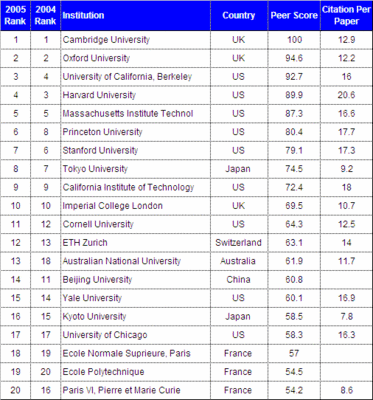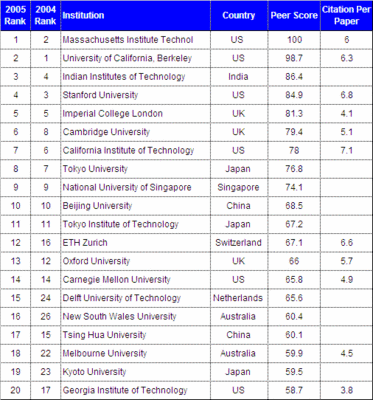The following table shows the top 20 Science universities in the world as per the THES survey. It is interesting to note that it appears that Oxbridge universities are actually rated better than the top universities in the United States for this year, and the previous year.

More interestingly, however, and it appears that the University itself have not yet discovered this, University Kebangsaan Malaysia (National University of Malaysia, UKM), has been included amongst the top 100 science universities in the world. UKM is ranked joint 91st, an improvement from being unranked in the previous year. UKM was also unranked in the world's top 200 universities ranking list for 2005 by THES. In this particular case, the ranking might just be a tad more credible than the achievement by Universiti Malaya and Universiti Sains Malaysia, which achieved their respective 89th and 111th world ranking last year, on the basis of a misguided "international faculty and students score". In this particular case, the science university ranking is provided purely on the basis of "peer review", although UKM had no "citations" to speak of. I would definitely be interested to find out more about the methodology used to derive the "peer review" score.
For those interested, the National University of Singapore (NUS) and Nanyang Technological University (NTU) are ranked 34th and 84th respectively. I've provided the table of the universities ranked 90th-100th below:

The top 100 technology universities of the world on the other hand, has a slightly different make up at the top. In this case, the universities of the United States are stronger and the top 20 consists of 7 universities from Asia as shown below. It appears that the Asian universities have been more adept in embracing technological advances to build competitive strengths than those in the Europe, which is represented by only 4 universities, of which 3 are from the United Kingdom (UK).
None of the Malaysian universities made it to the top 100 list for technology universities. On the other hand, Singapore fared particularly well here, with NUS and NTU ranked 9th and 26th respectively. More interestingly, Chulalongkorn University of Thailand made it to the 100th placement.

I hope that the above tables have been informative. I've received plenty of friendly criticisms on my blog post that I pay "way too much" attention on ranking tables for Universities. My personal opinion is that ranking tables are never going to be 100% accurate. However, I strongly believe that if the right methodology is used for the relevant compilation, the ranking tables will provide a good indication of where a university stands. For example, there probably isn't going to be much of a difference between enrolling into a university ranked 16th vs one that is ranked say, 24th. However, between say 16th and 67th, or say, between 48th and 97th, there are bound to be some significant differences.
In an age that we are bombarded with too much information, the bulk of which are ingeniously manipulated marketing information, there is a major need for some form of credible comparison tables to provide objective information to educators, students and parents. Go visit a website of a university ranked say, 104th and that of one ranked 12th, you will find that it is extremely likely that a student is unable to tell the difference in terms of quality between the two institutions. In fact, the lower ranked institution is more likely to "oversell" is quality and achievements in order to attract more students to the university, especially in the age where higher education is facing mass commercialisation.
Hence if anything, my approach to ranking tables will be to continually improve its accuracy and methodology, rather than to completely abandon or ignore such findings.
hie,
ReplyDeleteI am a follower of you blog. Its good to know that there is a site dedicated on the discussion of our education system.
I know many of us think of US/Europe/Aus as the ideal tertiary education location. But i personally feel that there are also many great universities in Asia that many of us might have overlooked. In terms of quality of education they are definitely competitive, and also not forgeting the value for money.
You think its possible to give more coverage, or mayb a post on Asia's top league uni? That would be nice
I cant wait to see if UM actually made it into the list or not.
ReplyDeleteHey Anon,
ReplyDeleteDon't get to excited about the new list. For all you know, UM's ranking will actually improve because with the new "meritocracy" policy, the percentage of "foreign" Chinese and Indian students in our campus actually increased. :)
It really depends on whether the guys at THES and QS rectify their methodology and reviewed their understanding of the data on Malaysia.
Tony P :)
Hey Tony,
ReplyDeleteI find your blog very informative. However, as you have already pointed out, you are indeed paying too much attention on rankings and "branding" of the universities.
Although rankings can give some indication of a university's appeal, it does not give the full picture. Moreover, comparing them with universities from different countries makes it even more difficult to give a definite and credible table. Sure, the top 10 universities of the world will always be there - namely Oxford, Cambridge, Harvard, MIT, etc. But for the rest, it is almost impossible to compare.
Much debate has been going on about rankings done by the US News, THES, and others. Too much emphasise is given to "traditional" universities. Other reasons include that the methodology focuses too much on accommodating the higher-ranked unis - as if these rankings were customized for them. Hence, the drop in other reputable higher-learning institutes.
As in the case of UM, I believe that they have their pros and cons. Yes, we all know about the mis-management and politicking that goes on. But there are certain areas where we actually excel. Such as the med school where a team of researchers discovered the Nipah virus and Dr. Gomez (aside from the controversy) who was selected to head a research project for the United Nations.
In all honesty, I sometimes find it sad at how people look down on our public universities. Painting a bad picture about UM, UTM, etc. will discourage students and academic staff of the work they do. And they do a pretty damn good job I might add. You were fortunate to have a good strong education, but not many are as lucky. So they'll have to settle instead for the local universities, or sometimes even the private colleges/universities.
-observer
Hey Observer,
ReplyDeleteAs I mentioned earlier, ranking tables will have their weaknesses, particularly when compared internationally. At the same time, ranking tables have their definite usefulness. That's all I'll add to the "rankings" debate.
I'd also like to comment that I have no prejudice against a university ranked 50th or even 180th. (I may however, have problems with universities ranked above say, 1000). Every decent university will serve their purpose for the students they cater to. All I like to emphasise is for the right calibre students to target entry into the right quality universities. I think it's an absolute waste for a say, top student in the country to join say, the 169th ranked university, instead of a top 10 one, which he or she will qualify.
In addition, if you have read many of my other posts, I'm a fan of UM graduates and hire many of them. I've also hired top students from UKM, UPM, MMU, USM and UTM. I would not have hired (and retained) them if they were not competent. However, as Kian Ming commented on one of my post earlier, did these students achieved what they did inspite of the system, rather than because of it.
Please also note that my criticisms are meant to be constructive, and not as "ends in themselves". I would be extremely happy if one day, Malaysian universities rectify their shortcomings and become real top-class institutions we can be proud about.
Tony P :)
While some people who read this blog might not be such big fans of university rankings (or rankings of any sort), it is undeniable that UM has and will continue to use these rankings to provide an artificial, in my opinion, sense of false confidence. Remember all those posters and signboards in UM during their 100th anniversary? This will definitely postpone much needed reform within the local university system. And you can bet that UM will have some more of those posters up if this year's rankings show an improvement in UM's ranking.
ReplyDeletexxxxxxx
ReplyDeletehttp://www.bakrimusa.com/archives/an-education-system-worthy-of-malaysia-16#comments
xxxxxxxxxxx
This comment has been removed by a blog administrator.
ReplyDeleteThis comment has been removed by a blog administrator.
ReplyDeletehow come nus don't have citation score but was not pointed out. but it's important to point that out in the case of ukm ranking in the other list. ehhm! as usual ...
ReplyDeleteukm in engineering?...so that bad actually
ReplyDeleteMALAYSIA TAK BOLEH AND SUCKS BALLS! THE UKM AND OUM HAVE CALCUTTA CHILDREN TEACHERS WHO R STUPID AND NOT OFFICIALLY A TEACHER!!! I AM IN MIT!!!!! MALAYSIA IS A HOPE OF MALAYSIA TAK BOLEH AND SUCKS BALL NATION!!!
ReplyDeleteLOLOLOLOLOLOLOLOLOLOLOLOLOLOLOLOLOLOLOLOLOLOLOLOLOLOLOLOLOLOLOLOLOLOLOLOLOLOLOLOLOLOLOLOLOLOLOLOLOLOLOLOLOLOLOLOLOLOLOLOLOLOLOLOLOLOLOLOLOLOLOLOLOLOLOLOLOLOLOLOLOLOLOLOLOLOLOLOLOLOLOLOLOLOLOLOLOLOLOLOLOLOLOLOLOLOLOLOLOLOLOLOLOLOLOLOLOLOLOLOLOLOLOLOLOLOLOLOLOLOLOLOLOLOLOLOLOLOLOLOLOLOLOLOLOLOLOLOLOLOLOLOLOLOLOLOLOLOLOLOLOLOLOLOLOLOLOLOLOLOLOLOLOLOLOLOLOLOLOLOLOLOLOLOLOLOLOLOLOLOLOLOLOLOLOLOLOLOLOLOLOLOLOLOLOLOLOLOLOLOLOLOLOLOLOLOLOLOLOLOLOLOLOLOLOLOLOLOLOLOLOLOLOLOLOLOLOLOLOLOLOLOLOLOLOLOLOLOLOLOLOLOLOLOLOLOLOLOLOLOLOLOLOLOLOLOLOLOLOLOLOLOLOLOLOLOLOLOLOLOLOLOLOLOLOLOLOLOLOLOLOLOLOLOLOLOLOLOLOLOLOLOLOLOLOLOLOLOLOLOLOLOLOLOLOLOLOLOLOLOLOLOLOLOLOLOLOLOLOLOLOLOLOLOLOLOLOLOLOLOLOLOLOLOLOLOLOLOLOLOLOLOLOLOLOLOLOLOLOLOLOLOLOLOLOLOLOLOLOLOLOLOLOLOLOLOLOLOLOLOLOLOLOLOLOLOLOLOLOLOLOLOLOLOLOLOLOLOLOLOLOLOLOLOLOLOLOLOLOLOLOLOLOLOLOLOLOLOLOLOLOLOLOLOLOLOLOLOLOLOLOLOLOLOLOLOLOLOLOLOLOLOLOLOLOLOLOLOLOLOLOLOLOLOLOLOLOLOLOLOLOLOLOLOLOLOLOLOLOLOLOLOLOLOLOLOLOLOLOLOLOLOLOLOLOLOLOLOLOLOLOLOL
thanks for the list, i can help out for my sister who looking for this information, just drop a msg to thank you
ReplyDeletedude..the engineering in IIUM is terribly difficult..
ReplyDeleteUTM has been regarded as Malaysia's premier institution of higher learning in Engineering and technology and has at times been nicknamed the MIT of Malaysia.
ReplyDeleteDear Tony,
ReplyDeleteDo you have particular statistics on student admission of school of technology in Malaysia 2005-2010 ? What particular departments within the schools are the most preferred (by ranking) ?
Thank you so much.